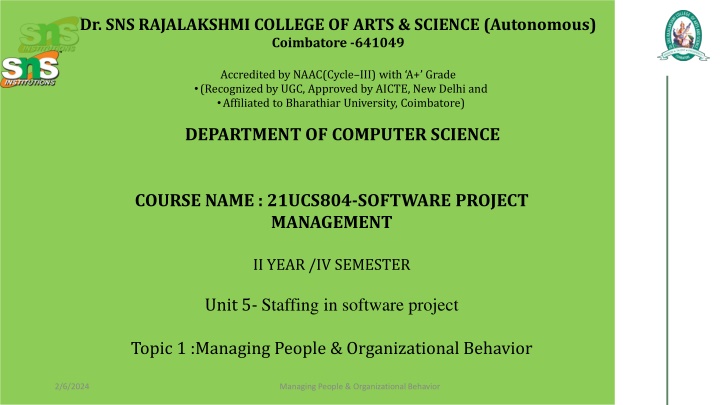
People and Organizational Behavior in Software Project Management
Learn effective strategies for managing individuals and fostering positive team dynamics in software projects. Explore concepts such as understanding individual strengths, effective communication, team building, continuous learning, recognition, managing remote teams, time management, and adaptability. Gain insights into communication patterns and leadership styles for successful project outcomes.
Download Presentation

Please find below an Image/Link to download the presentation.
The content on the website is provided AS IS for your information and personal use only. It may not be sold, licensed, or shared on other websites without obtaining consent from the author. If you encounter any issues during the download, it is possible that the publisher has removed the file from their server.
You are allowed to download the files provided on this website for personal or commercial use, subject to the condition that they are used lawfully. All files are the property of their respective owners.
The content on the website is provided AS IS for your information and personal use only. It may not be sold, licensed, or shared on other websites without obtaining consent from the author.
E N D
Presentation Transcript
Dr. SNS RAJALAKSHMI COLLEGE OF ARTS & SCIENCE (Autonomous) Coimbatore -641049 Accredited by NAAC(Cycle III) with A+ Grade (Recognized by UGC, Approved by AICTE, New Delhi and Affiliated to Bharathiar University, Coimbatore) DEPARTMENT OF COMPUTER SCIENCE COURSE NAME : 21UCS804-SOFTWARE PROJECT MANAGEMENT II YEAR /IV SEMESTER Unit 5- Staffing in software project Topic 1 :Managing People & Organizational Behavior 2/6/2024 Managing People & Organizational Behavior
Managing People 1.Understanding Individual Strengths: Recognize the unique skills and strengths of each team member. Assign tasks based on their expertise and interests to maximize productivity and job satisfaction. 2.Effective Communication: Clear and open communication is vital for project success. Establish regular meetings, use collaborative tools, and encourage feedback to ensure everyone is on the same page. 3.Team Building: Foster a positive team culture where members feel valued and motivated. Organize team-building activities, celebrate achievements, and encourage a supportive environment. 4.Continuous Learning: Encourage continuous learning and skill development. Provide opportunities for training, mentorship, and participation in conferences or workshops to keep the team updated with the latest industry trends and technologies. 5.Recognition and Rewards: Acknowledge and reward exceptional performance to boost morale and motivation. Implement a system of recognition, whether through bonuses, promotions, or public praise, to show appreciation for hard work. 2/6/2024 Managing People & Organizational Behavior
Managing People 6. Managing Remote Teams: With the rise of remote work, effective management of distributed teams is crucial. Utilize collaboration tools, establish clear communication channels, and set realistic expectations to ensure remote team members remain engaged and productive. 7. Time Management: Help team members manage their time effectively by setting clear priorities, establishing deadlines, and providing resources to support task completion. Monitor progress regularly and offer assistance when needed to prevent delays. 8. Adaptability: Remain flexible and adaptable in response to changing project requirements, timelines, or team dynamics. Encourage creativity and innovation to overcome challenges and achieve project goals. 2/6/2024 Managing People & Organizational Behavior
Organizational Behavior 1.Communication Patterns: Effective communication is essential for coordinating tasks, resolving conflicts, and ensuring alignment among team members. OB in software project management examines the channels of communication within the team, whether they are formal (such as meetings, emails, and status reports) or informal (such as casual conversations or social interactions). Understanding communication patterns helps project managers identify potential bottlenecks or misunderstandings that can impede project progress. 2.Leadership Styles: Leadership plays a crucial role in guiding software development teams towards achieving project goals. OB in software project management examines different leadership styles, such as autocratic, democratic, transformational, and servant leadership, and their implications for team performance and morale. Effective leaders inspire and motivate team members, provide clear direction, and facilitate communication and decision-making processes. 2/6/2024 Managing People & Organizational Behavior
Organizational Behavior 3. Organizational Culture: The organizational culture profoundly influences how software development projects are planned, executed, and monitored. OB examines the shared values, norms, and beliefs within the organization, as well as its approach to risk-taking, innovation, and change management. A supportive and adaptive organizational culture fosters employee engagement, resilience, and commitment to project success. 4. Conflict Management: Conflicts are inevitable in software development projects due to differences in opinions, priorities, and objectives. OB explores strategies for identifying, addressing, and resolving conflicts constructively within project teams. Effective conflict management promotes open communication, mutual respect, and collaborative problem-solving, minimizing disruptions and enhancing team cohesion. 5. Motivation and Engagement: Motivated and engaged team members are more likely to contribute positively to software projects and go the extra mile to deliver high-quality results. OB examines motivational factors such as recognition, autonomy, job satisfaction, and opportunities for professional development. Project managers can leverage this knowledge to design incentive systems, provide meaningful feedback, and create a supportive work environment that fosters employee engagement and commitment. 2/6/2024 Managing People & Organizational Behavior
ASSESSMENT 1. Explain the concept of Organizational Behavior? 2/6/2024 Managing People & Organizational Behavior
References 1. Bob Hughes, Mike Cotterell and Rajib Mall: Software Project Management, McGraw Hill Education; 5 edition (1 July 2017), ISBN-10: 0071072748, ISBN-13: 9780071072748 2. A Kelkar, "Software Project Management A Concise Study", Third Edition, 2012, PHI Learning, ISBN- 10: 8120347021, ISBN-13: 978-8120347021. Thank You 2/6/2024 Managing People & Organizational Behavior
